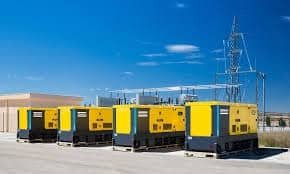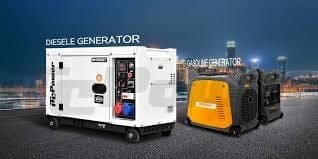Meta Description: Find out what the primary variations between gasoline and diesel generators are, including their fuel source . Evaluate the fuel economy, horse power, maintenance and breakages to know what to choose to your power requirements.
Comparing based on the key differences between diesel generator and gasoline generator can help you save a lot of money and rely on the correct source of power in regard to your particular requirements. These two kinds of generators perform the same main task, which is to transform the mechanical energy into electric power; however, they are different and they have various pros and cons.
Understanding the Basic Differences Between Diesel and Gasoline Generators
The basic distinction of the diesel and gasoline generators is in the combustion process. Diesel generators produce electric current through compression whereas gas generators are using carburetors. Diesel engines are of compression ignition design which involves the compression of air to high temperatures prior to the introduction of fuel which ignites as soon as it is injected. Gasoline engines depend on spark plugs that set fire to a fuel air mix in the combustion chamber. Such a disparity can alter most aspects of their operations, including efficiency, maintenance, and general performance.
Fuel Efficiency: Why Diesel Generators Lead the Pack

Diesel generators consume half of that used by petrol generators, and this makes diesel generators much more economical in consumption of fuels. This efficiency stems from diesel fuel’s higher energy density – approximately 15% more energy per gallon compared to gasoline. On the diesel engines, the compression ignition method is also able to obtain more energy with each unit of fuel utilized. This can result in massive savings on cost operations to businesses and individuals that need to have a long-running period because it will save on cost when operations have to be extended in a long power interruption or power outages when there is a constant running condition.
Power Output and Performance Comparison

The size of the portable generator with a 5kW diesel engine will generate approximately 20 percent higher power than the petrol parallel. Diesel generators are also excellent in terms of delivering constant power over long periods hence fit to serve applications in heavy duty fuel types. They are better in managing changing loads and are more able to keep the voltage and frequency constant with the changing demands. Although gasoline generators have each of these advantages of starting fast and producing sufficient power to handle lighter loads, they can develop regularity issues over a sustained time period or when driving high-quality machinery regular maintenance.
Initial Investment and Purchase Cost Analysis
Gasoline generators are usually less capricious in terms of initial investment than diesel motors. Some of the manufacturing costs of gasoline engines are also low because of low design demands and the availability of components in general. But this initial saving may be deceptive in terms of the long run operation outgo. Diesel generators also prove relatively cost-effective over their lifetime since they can be purchased more cheaply and have longer life, are more fuel-efficient and require less frequent maintenance, given the same initial cost of a diesel generator should cost more than a gas prop generator.
Long-term Operating Costs and Economic Benefits
Diesel engines are likely to have reduced operating costs in both medium-term and long-term because they have a higher fuel efficiency and their maintenance period. Although prices of diesel fuel may vary, the lower rate of consumption may end up saving the cost of fuel longer lifespan. One more advantage of diesel engines is that these engines do not require oil change and replenishment of parts as often. Diesel engines are well built making them less prone to breakdowns and repairs decreasing the maintenance cost as well as the maintenance downtime which can prove to be very expensive to the business on site storage.
Durability and Lifespan Expectations
A diesel generator has a better ability to be durable when compared to the gasoline one because the former has a more sturdy nature and design. Diesel engines work with lower RPMs, which implies that they limit wear and tear on the insides. The missing spark plugs avoid one of the most usual failure specifications of the gas-powered engines. Ensuring maintenance, diesel-powered generators offer a service life of 12,000-30,000 hours and installation of gasoline generators experiences the service life of 1,000-2,000 hours. This long life is also why diesel generators are so favored to be used as standby power generators.
Maintenance Requirements and Service Intervals
The two types of generator also differ greatly as far as maintenance needs. Gasoline generators need more maintenance such as frequent cleaning of carburetors, changing the spark plugs and changing oil after every 50-100 hours of usage. Diesel generators have a longer service period and the engine has to be changed in every 250-500 hours. Diesel maintenance is, however, more complex in many cases, sometimes needing an expert knowledge and which may be more expensive in terms of labor cost when professional assistance is required.
Environmental Impact and Emissions Profile
Newer diesel generators emit lower emissions, including less carbon dioxide gas per energy produced compared to gasoline generators mainly due to their high efficiency in burning fuel. Diesel engines however generate greater quantity of nitrogen oxides and particulate matter, which may be worrying in some applications. Gasoline generators produce more particulate emissions in comparison to gasolines, though they require more gasoline to produce the same amount of power. Environmental standards are gradually causing a shift toward type of technology that burns cleaner; this will affect which type of generator is used in specific applications and settings prime power.
Noise Levels and Operational Considerations
The current use of diesel engines is a vast improved version of the previous versions that were a menace as a result of excessive noise less maintenance. Currently the newer diesel engines have reduced noise compared with the older models but are still noisier than the similar size gasoline generators and natural gas option more frequent maintenance
. The gasoline generators usually run faster on RPM producing a lower frequency that other users can easily appreciate. In residential use or noise sensitive applications this difference can be a major factor in determining choice generator type
.
Cold Weather Performance and Reliability
Diesel generators can face challenges in extremely cold conditions due to diesel fuel’s tendency to gel at low temperatures. This necessitates fuel additives or furnace in a cold environment. Gasoline generators generally start more easily in cold weather but may experience fuel system issues due to gasoline’s volatility and tendency to form deposits over time higher maintenance costs. There are also appropriated winterization procedures to be followed between the two types however the requirements are different depending on the type of fuel and the climate surrounding that particular area emission regulations.
Fuel Storage and Safety Considerations
The storage of diesel fuel is also safer because of the low volatility and high flash point as these properties are compared to gasoline. Diesel also has lower flammability, burns less probably in case of accident and also has less vapor concentration, hence it is safer to keep in large quantities. Nevertheless, the diesel fuel may have a microbial growth with time and therefore have fuel stabilizers and also testing, impacting fuel availability gas line. Gasoline requires more careful handling due to its flammability but generally doesn’t face the same biological contamination issues as diesel.
Applications and Best Use Scenarios
Diesels generators are efficient stand-by generators since they have large run times and use less fuel. They perform best in the industrial applications, construction site and in backup power systems where the high run time is paramount. Gasoline generators are great products to use in recreational activities and short-term emergency backup and activities where you need to make it portable and take a shorter time to start. Depends on the requirements of duty cycles, infrastructure available and special performance demands reliable power.
Industry Trends and Future Considerations
The generator business keeps further transforming with enhanced emissions, use of hybrids and use of different fuels. As the diesel technology improves diesel generators tend, it centers on cleaner burning and less smoke, therefore, the gasoline generators have better injection systems and electronic controls. Being aware of such trends would assist in making future-proof decisions that would correspond to evolving regulations and advancements in technology diesel units.
GWT Origin: Shenzhen Guanwutong international freight forwarding co Ltd is a professional logistics service supplier who has been engaged in international freight forwarding service and supply chain management and establishment provider natural gas emits. Our services encompass air freight, sea freight, China-Europe railway transportation, customs clearance and Amazon FBA shipping services with the high quality and low-cost logistic services in business around the world.
Conclusion
Diesel generators and gasoline generators are the final decision you make which is based on your needs and the budget of purchase and the intended purpose. Diesel generators are superior in value, although in the case of heavy industrial use with a long application life where fuel efficiency and longevity are prime concerns, diesel generators are more properly used in lieu of gasoline generators. In a recreational setting, in applications that must be carried and moved around, or where a fast deployment can be performed due to the ease of set up and maintenance diesel vs, the gasoline generators present convenient features that can be more valuable than the restrictions of operation when compared to diesel models .
